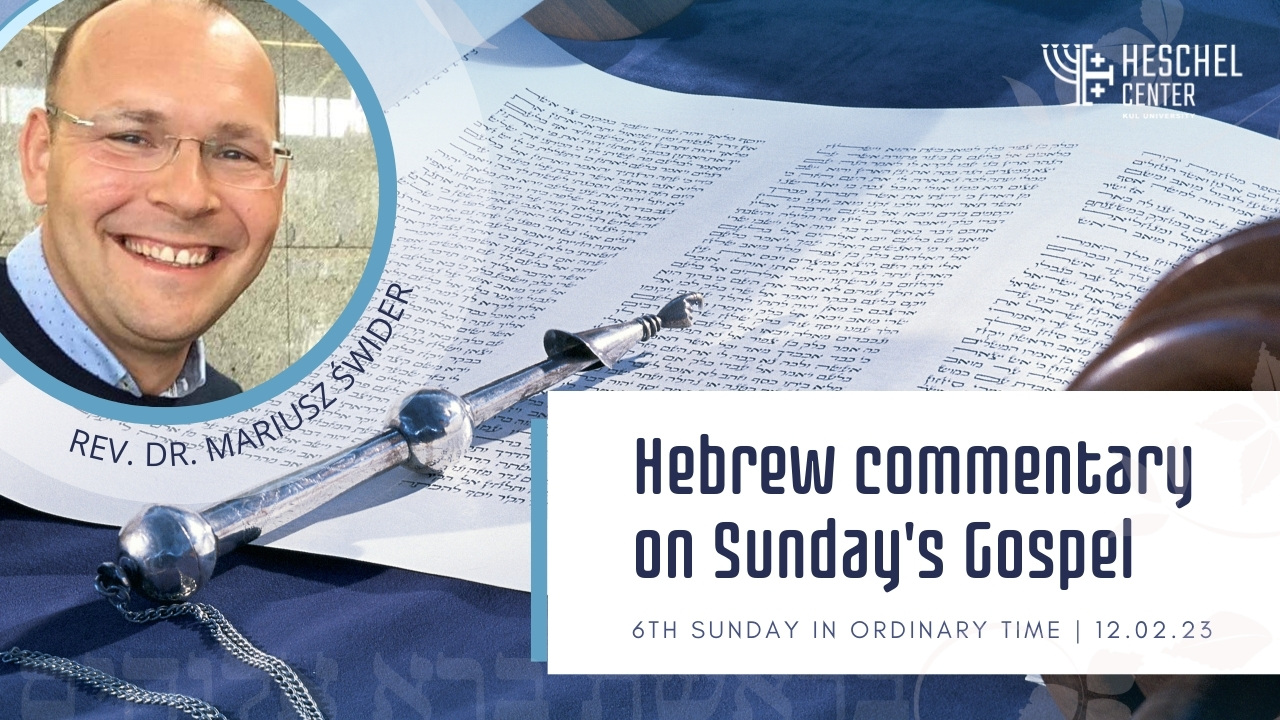Law, Prophets, iota – we need to examine the context to understand the meaning of Jesus’ words


photo by KUL Heschel Center
The Gospel verses for this Sunday are full of terms from Jewish culture. Is it easy for us today to grasp notions such as the “Law”, “Prophets” or “iota”? Do we understand the terms the way Jesus understood them? This significance of context as the first step in a thorough study of the Bible is indicated by Bible scholar Rev. Dr. Mariusz Świder, Rector of the John Paul II Seminary of the Diocese of Siedlce in his commentary for the Sixth Sunday in Ordinary Time.
In the sermon on the Mount of Beatitudes, Jesus highlights the fact that He does not “come to abolish the law or the prophets. I have come not to abolish but to fulfil.” What does Jesus want to fulfil the Law and the Prophets with? “Jesus wants to fulfil the Law with what was missing from that man who wanted to make his gift before the altar and realised he had something against his brother. Jesus wants to fulfil the Law with what was missing from that man who looked with lust at the woman, and from that man who does not keep God’s Commandments. Jesus wants to fulfil the Law with LOVE,” indicates Fr. Dr. Świder in his commentary.
The full text of the commentary to the Gospel according to Matthew (Mt 5:17-37) read on the Sixth Sunday in Ordinary Time, Year A.
“A text without context creates a pretext”, I once heard from a priest, a Bible scholar. I fully agree with this statement, especially in reference to Scripture, both the Old and New Testament. The text of the Bible was being penned for over a millennium by a few dozen inspired authors, however, in an entirely different setting conditioned by a cultural, religious, historical, geographical or linguistic context which is different from ours. The discerning reader of the sacred text in his or her diligent analysis cannot fail to take into account the complexity of the context of each biblical pericope. Seeing this context as the background to Gospel verses helps to better understand the message conveyed.
The Gospel of the 6th Sunday in Ordinary Time comes from a book marked by a very strong Jewish flavour. Both its author Matthew (Levi) and its recipients (mainly Judeo-Christians) were rooted in the religion and customs of the Chosen People. Today’s pericope (Matthew 5:17-37) quoting an excerpt from a “sermon” Jesus delivered by the Sea of Galilee on a hill called the “Mount of Beatitudes” is very much saturated with terms embedded in the broader Jewish culture. Jesus makes a great many references to Jewish culture and the Jewish religion. If it were not for general historical, theological and biblical knowledge, would it be easy for us today to understand the words such as: “Law”, “Prophets”, “iota”, “scribes”, “Pharisees”, etc? Context analysis should be the first step in a serious, scientific study of the Bible.
In the Gospel, Jesus stresses that He does not “come to abolish the law or the prophets. I have come not to abolish but to fulfil” (v. 17). What will he fulfil it with? With what was missing from the man who was angry with his brother (v. 22), the one who had to leave his gift at the altar (v. 24), the one who found it hard to reconcile with his opponent (v. 25), and the one who regarded the woman with lust (v. 28), i.e. LOVE. May we too fill our lives only with love!
About the author:
Fr. Dr. Mariusz Świder, Bible scholar, Rector of the John Paul II Seminary of the Diocese of Siedlce, postulator of the beatification process of Servant of God Bishop Ignacy Świrski.
Heschel Center KUL: What do salt, light and the city on a mountain mean to us? >>>
Heschel Center KUL: Why did the disciples, becoming „fishers of men,” abandon their nets? >>>
Hebrew Commentary to the Sunday Gospel excerpt – 2nd Sunday in Ordinary Time; Year A >>>
Jewish Commentary on the Gospel >>>
Hebrew commentary on the first Sunday of the New Year Gospel >>>
Jewish commentary on the Christmas Gospel >>>
Hebrew commentary on the Gospel for the Fourth Sunday of Advent >>>



Dodaj komentarz